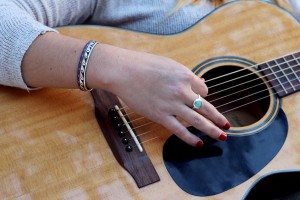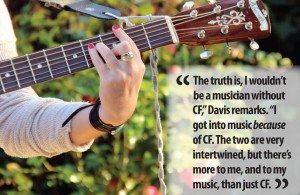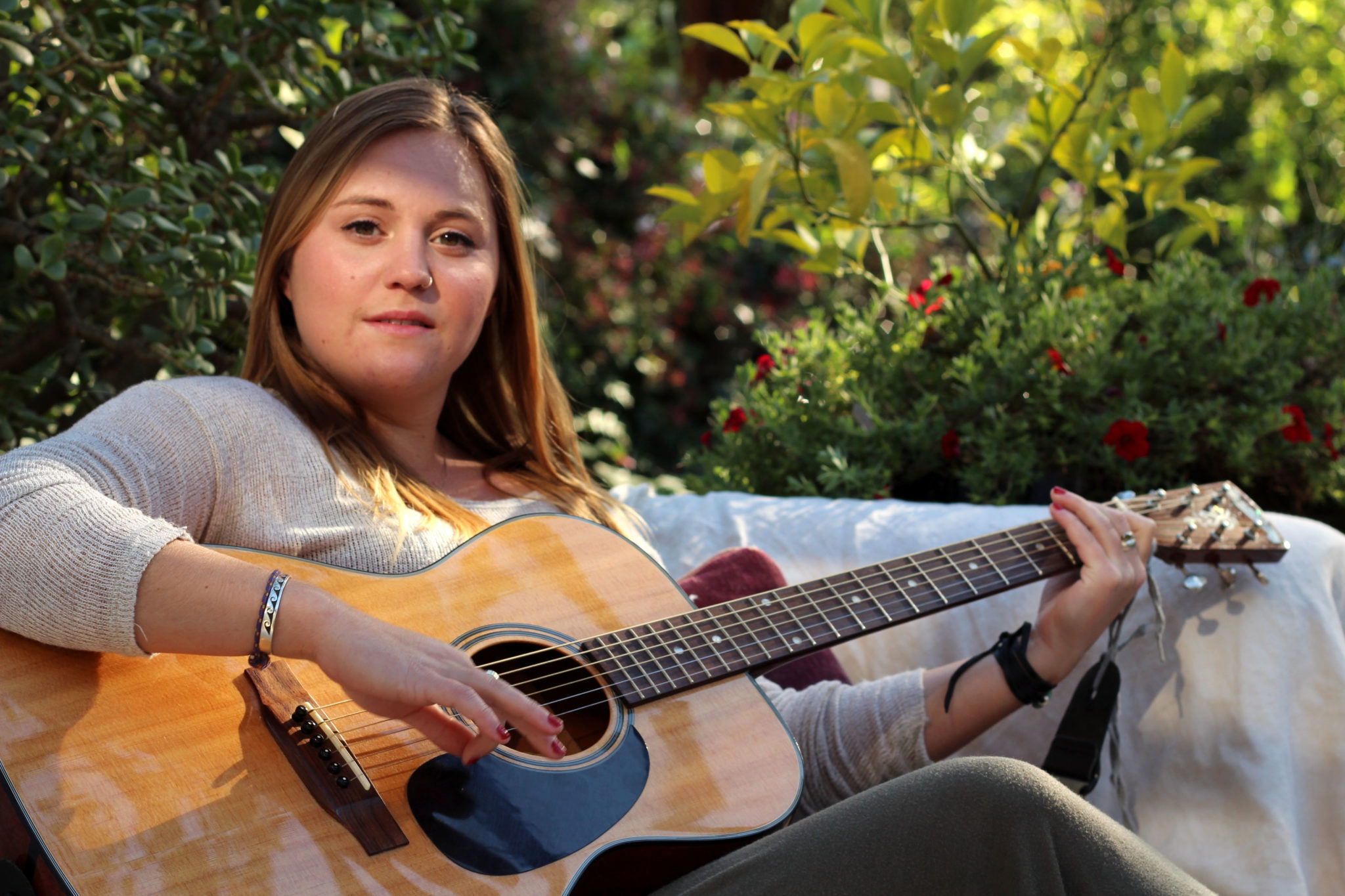by David Templeton
Ups and downs, flips and turns, twists and changes—that pretty much defines me,” says Olivia Davis with a laugh, her smile so convincingly upbeat that one would not easily guess at the rough road she’s traveled to arrive at this moment in time, a sunny morning in Marin County, freshly printed CDs in her bag, sitting at a coffee shop in San Rafael, sharing a cup of tea—along with her remarkable story— with a journalist. “Over the last couple of years,” Davis says, “my life has definitely been a series of flip opposites, one after another.
“It’s been rough,” she admits, “but also incredible!” Those flips and twists and competing opposites are just part of what makes the music Olivia Davis writes so moving and engaging. Till now, it’s been only her closest friends, family and a select number of doctors and nurses who have heard that music. But as a result of one of those aforementioned “twists,” that is all about to change.
At 20, the Marin-born singer-songwriter with the lilting country twang has just released her first professionally recorded CD, a remarkably engaging, deeply personal alt-country eye-opener titled The Starting Line. It’s an appropriate enough name for what Davis (www.oliviadavismusic.com) sees as a whole new beginning to a life that, at times, has felt like a long-distance race over rocky terrain.
Supported by a spate of local concerts and radio appearances, the new, independently recorded and distributed CD has been greeted with acclaim and close attention, as much for the sweetness and power of Davis’ singing voice as for the insight, wisdom and soulfulness of her lyrics. Remarkably, the five songs on The Starting Line speak to both young and old, appearing to mean one thing on the surface, while revealing more, to anyone who listens for the story beneath the story.
“That was intentional,” Davis says. “I want my songs to be applicable to lots of people in different situations. They are very personal, but also very universal.”
For example, “Back of My Mind,” the infectious first track on the CD, sounds upon first listen to be a standing-at-the-crossroads look at the impending loss of a relationship.
“Looking back on this one, I think it was a little prescient of me,” she says of the song she actually wrote during her college application process. “I was filling out these forms, and I was really stressed out, not even sure going to college was what I wanted to do.”
As a listener, once you know that, the whole song opens up.
“There’s a line in the song,” Davis explains, “‘How many things can I write to win? Guess I’ll just be who I’ve been.’ That’s about writing these essays trying to prove I was someone they wanted to have at their school. It’s a song about wanting to be liked by people I wasn’t even sure I wanted to like me. It’s about blindly doing what other people—my parents, my college counselors—said I should be doing.”
That said, if her fans find meaning in the song as a tale of a person giving up on a relationship where too much has been demanded, she’s just fine with that.
“I want listeners to be able to hear my songs and create their own stories, create their own version of what they’re about,” she says. “I love it when I listen to writers who do that—writers like the Dixie Chicks and John Prine. I think that’s what makes a great song.”
As it turned out, Davis—who grew up in San Rafael, attended Marin Academy and played the flute in the school music program—eventually was accepted at UC Santa Barbara, where she began with no declared major, focusing primarily on environmental sciences, the field her father works in. Still not certain where her future was headed, she went to classes, wrote songs on her guitar and waited for clarity.


Then, in the fall of her sophomore year, everything changed.
“I got really, really sick,” she says. “Which I guess is nothing new for me, but that fall, it was the worse it’s ever been.”
Davis, though she’s always downplayed it, has had cystic fibrosis her entire life, diagnosed with the degenerative genetic disease when she was just a year old. Primarily affecting the lungs, cystic fibrosis (CF) also affects the pancreas, liver and other organs. Since childhood, Davis has been receiving treatments for the disease, which include an annual two-week-long stay in the hospital to run a vital “Pulmonary Function Test,” measuring her lung health, and comparing it to previous years.
“We call them PFTs,” says Davis, a veteran of nearly 20 such annual hospitalizations. “Basically,” she explains, “PFTs measure the percentage of lung function you have compared to someone your age who doesn’t have CF. Someone your height, and your size. At my healthiest, when I was little, I would score in the hundreds, sometimes even over a hundred percent. But slowly it got worse, and then in high school and early college, it was like, in the 70s.”
That fall, during her second year at UC Santa Barbara, she knew something was different, and the PFT confirmed it, showing a lung function score of just 53 percent.
“I’d never been that low,” Davis says. “It was very scary, so I basically left school immediately and checked myself into the hospital. California Pacific Medical Center— that’s where I’ve been going since I was diagnosed. I was in for a total of two months over the course of that winter. I was really, really sick.
“Not too surprisingly,” she adds, “I ended up in a very dark place. That whole time, I was figuring out what I should do. What should I do about finals? Should I go back to school? I was suddenly faced with something that made me really aware of time, of being in the present. During that time in the hospital, we really didn’t know if I was going to ever get better. A lot of time, what happens with CF patients is that they get really sick, and that PFT becomes their new baseline. It is a degenerative disease, which means it gets worse and worse over time. So for all I knew, 53 [percent] could be my new normal.
“It was,” she succinctly acknowledges, “a very scary time.”
There were, for what it’s worth, a few compensations that helped Davis keep her spirits up over the course of her long recovery. For one thing, during her hospital stay, she was surrounded by people who’d known her for years.
“All the same doctors and nurses have been taking care of me since I was a baby,” she says. “When I was little, the one thing that made going to the hospital not terrible, was that I got to hang out with all my nurse friends.”
Another thing that helped, a lot, was her music.
“I actually think singing has helped me build lung function,” Davis says. “Any exercise that helps you control your breathing is a good thing. That’s why I started flute lessons when I was in fifth grade. Wind instruments are helpful for kids with CF.
“CF kids are also known for their raspy voices,” she adds. “I used to worry I wouldn’t have enough breath to sing powerfully, but my voice coach Amber always says, ‘I don’t want you to think that way about singing. Don’t think you get the best sound if you have the most air. It’s not about air. It’s about where you’re directing the sound.’ She didn’t want me to feel like I wasn’t going to be able to sing as well as others just because I don’t have as much lung function as others.”
Davis—who started writing her own songs in high school—was accustomed to hauling her guitar for her annual two-week stays at the hospital, where CF patients were encouraged to decorate their rooms and bring along whatever made the stay easier.
It was during one stay, while she was in high school, that Davis wrote the song “For Mother,” the second track on her CD. A lullaby and a love song, “For Mother” was written from the point of view of a mom sharing a few tender words of wisdom with her child.
“Growing up,” Davis recalls, “I never saw how different my life was from other kids. It was just part of my thing. I did meds a couple times a day. I went to the hospital once a year.
“As I’ve gotten older,” she goes on, “I’ve gained some perspective, and it’s like, ‘Wow! A lot of things in my life are not very normal.’ That might not have been very easy for my parents. It must have been so scary for them, at times. So that song is about finally appreciating what my parents might have gone through, bringing up a kid with a serious illness.”
During the dark days of the winter that she left college, wrestling with what to do if she did recover—which she eventually did—Davis found herself turning to her music in a big way.
It was a fact her parents took notice of.
“I just decided that school would be there for me if I decided to go back, but that right at that moment, I needed to do what makes me happy,” Davis says. “I didn’t know how much time I had to be doing the things I love. I was kind of depressed. That’s when I started to get into my music really seriously, writing a lot of new songs.”
That Christmas, looking for a way to lift their daughter’s spirits, Davis’ parents dreamed up an idea of a Christmas present that would ultimately do much more than that. It would give her a whole new direction in life.
Davis’ voice coach Amber Morris, along with Morris’ husband Tal Morris, own and operate Ice House Recording, a state-of-the-art recording studio in San Rafael.
So for Christmas that year, Davis’ parents told her they’d purchased a three-hour recording session for her, at one of the best recording studios in the North Bay.
“I thought it was going to be, like, this nice little recording of myself that I could keep for myself, and no one outside my family would ever hear,” Davis remembers. “I did not realize the extent of the actual project.”
According to Davis, it was around May of last year, when her health was showing gradual but steady improvement, that Amber Morris approached her.
“She said, ‘If our studio is going to produce this project, it has to be up to our standards,’” Davis says. “‘So this is going to be a real CD. You’re going to record it, distribute it and promote it—because it’s going to be a real thing.’ That was actually pretty exciting, but I still thought it was going to be just my guitar and me. I didn’t realize it would be me and a bunch of professional cover musicians, playing actual arrangements of my songs, with, actual cover art on the CD!
“It was Amber and Tal pushing me to take my music more seriously,” Davis says. “They encouraged me to own my identity as an artist.” What started out as a planned two-or-three-song recording session turned into several days, with the Morris’ donating the extra hours and talking a band of session players into contributing to the project as the young singer’s very first backup band. “It was my parents’ idea, and they paid for some of it, but the Ice House pretty much gave us this project,” Davis says, laughing as she adds, “I didn’t feel worthy! It was like, ‘Why do I get to do this?’ But then, when I started to hear my songs, all arranged and put together with other instruments, it was just the coolest thing in the world.”
She pulled together two more songs she’d written at various times in the previous years. “Who Am I Anyway” is a catchy song about an existential crisis, played as a smooth and sassy series of impossible questions and observations, and “On Hold,” probably Davis’ most consciously open song about the pain of being sick for so long, is a gorgeously crafted tune that alternates between slow-tempo laments and up-tempo defiance. “I can breathe,” she sings in the chorus. “I can breathe in my own way!”
There’s even a line about the bracelet she wears in the hospital during her regular stays among all those people who’ve watched her grow up over the years.
“The truth is, I wouldn’t be a musician without CF,” Davis remarks. “I got into music because of CF. The two are very intertwined, but there’s more to me, and to my music, than just CF.
“I’m trying to walk this thin line between my music and my illness,” she says. “I don’t want to come off like I’m using my illness as a tactic to get people to listen to my music. That’s not why I’m talking about it. I talk about CF because I want people to know about it. It’s part of my story—but it isn’t my whole story.”


“I think of it as my anthem,” Davis says with a smile. “It’s how I get through the times when I feel down. I just remember that life is precious, and sometimes you have to face an illness or a loss to really appreciate that.”
The recording sessions took place over a period of a few months last spring. The majority of them—all of Davis’ vocals and the accompanying session work—were recorded at Ice House. The CD, produced by Tal and Amber, along with producer and engineer Evan Galante, was mastered in San Rafael. Though a number of CDs have been printed for distribution to radio stations and newspapers—plus a few for Davis to carry with her, just in case—the strategy, at this point, is to put emphasis on Internet sales through CD Baby and on Davis’ website.
Of course, she’ll have CDs available at her concerts, too. And that’s the other piece of the transformation that started with one very bad winter over a year ago. Davis is now performing for other than just friends, family and nurses.
On February 26, she fulfilled a dream by playing at The Sweetwater in Mill Valley, opening for Peter Bradley Adams.
“I’m getting actual gigs,” she says with a laugh. “I’ve been really putting myself out there. It’s been such a whirlwind! In a way, it’s like that Christmas present ended up giving me more than just a recording session. Will I ever go back to school again and finish what I started? Maybe. But for now, I’m just going to take the path that’s in front of me.
“It gave me a whole new life!”
Ask David what his favorite Olivia Davis song is at [email protected].











